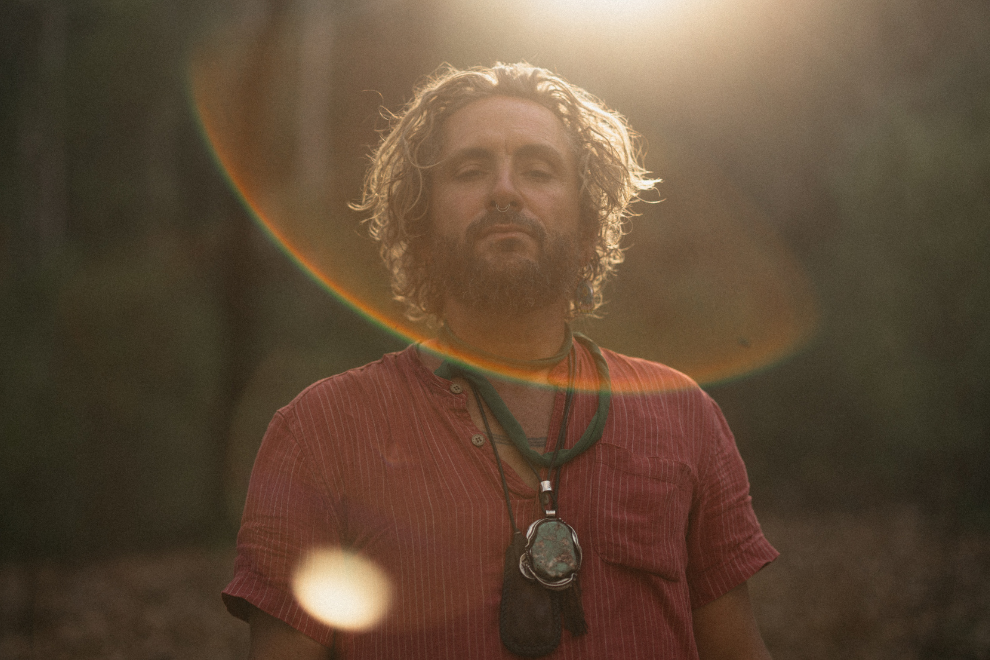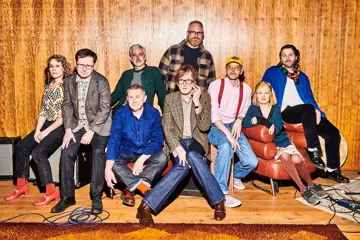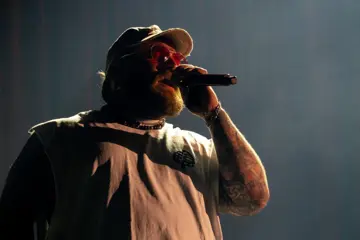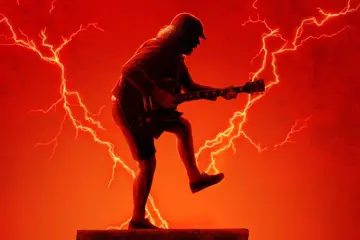 John Butler
John ButlerSitting at a mighty hour and 47 minutes, Running River is John Butler’s longest studio album by a significant margin (36 minutes, to be exact – 2004’s classic Sunrise Over Sea, which recently hit its vigintennial, clocks in at 71). But it’s only daunting on paper: in practise, the WA-via-California jammer’s first solo album in 12 years feels like a flash in the pan, teleporting listeners to a higher plane of experiential being with its droning, meditative rhythms and free-flowing passages of explorative and atmospheric bliss; when you lock in and surrender yourself to the howling reverb of Butler’s acoustic guitar and hand-pattered drums, the minutes simply melt away.
The first time I listened to Running River, I will admit I found it hard not to doze off – this is nearly two hours of balmy ambient roots music, after all, it’s decidedly tailored to imbue tranquility – but I can’t judge myself for it: speaking to TheMusic.com.au, Butler notes sleepiness as one of the tells he’s been successful in his cause. He minted the record with engineer and collaborator Dave Mann, and “oftentimes at the end of a take, when we’d listen back to what we’d just played,” he explains, “if we were kind of nodding off by the end of it, we were like, ‘Cool, it works!’”
Beyond its deeply personal genesis (which we’ll get to in a second), Running River was devised as part of Butler’s mission to “bomb the global nervous system” – this prevailing culture in the Western mainstream that is saturated by saturation. “There’s too much data, too much stimulation, too many flashing lights and blaring sirens,” Butler says. “Everything has been hyper-edited and everyone is forced to be connected, and I’m clocking a lot of people tuning out from reality. I’m not about the ‘stick your head in the sand and be an ostrich’ way of life, but I think in this day and age, when we have so much access to everything, we have to have a rigour and be disciplined in how we choose to engage with it.
“The whole world is pinging with notifications every five seconds, and what you see when you open them up, it’s either the cutest little doggy you’ve ever seen or it’s people being literally blown to smithereens. It’s dissociative mental torture – the CIA use that kind of stuff when they're interrogating captives, and we do it voluntarily! So my intention [with Running River] was to be a balm to that – to be slow, to give people a bit of relief from from the fray and the onslaught of real life.”
This process of using music to disconnect from reality is nothing new: for as long as melodies and rhythms have existed, so too has the listener’s ability to unplug from their own life and plug in to someone else’s – to landscapes entirely inconceivable without their tonal or conceptual guidance. But there’s an edge of rawness to the otherwise pastoral and idyllic soundscapes Butler explores on Running River – like the dry, hollow reverb on Clouds And Chimes and the improvisational noodling that backs Moonrise, or the communal harmonies on Watturu Chant – that makes it a uniquely cathartic album. It’s an ambient response to disarray, deliberate in its intention and (ironically) striking in its impact; it’s gentle, but it’s stern.
Like all his music does, this came naturally to Butler. The sonic palette of Running River is in fact wildly removed from the one he originally aimed to conjure in following up his chart-topping 2018 album, HOME.
The genesis of Butler’s ninth studio album began with a vision to build on the stylistic pillars of LP8 – his career-defining opus of bluesy, folky pop music – albeit without the scaffolding from which they flourished. He started writing, recording and producing it in isolation, losing himself in a menagerie of DAWs and distractions, with nascent ideas he simply couldn’t dedicate to cognisance when every other element of the album-making process – not to mention the parts of his life that exist beyond art – was piling up and crumbling all around him. “It was a pretty intense situation,” Butler says, sighing reflectively. “I was losing sense of what I was doing and where I was headed.”
It certainly didn’t help that in the years since he issued HOME, Butler endured a string of wallops that wore him down to a shell of his former self. Most significant was the tragic loss of his father, the grief impacted by his hand in providing palliative care – and the fact that less than 40 hours earlier, his wife Danielle (Caruana, aka fellow indie stalwart Mama Kin) lost her own father. Meanwhile, the iconic John Butler Trio – his creative lifeblood since 1998 – disbanded after years of personnel shifts and creative disjuncture. His responsibilities as a father were evolving as he helped his children navigate their own formative leaps. And his marriage, he notes, was “holding on by a weave of stress”.
Amid the turbulence, Butler wondered if his path as a career musician had eroded before him. He was alone, battered and listless; he saw no way forward. At his weakest moment, three years into working on LP9, he did the one thing he’d spent nearly three decades vowing he’d never do: he gave up. “I had to,” he says, the air of our conversation freezing with solemnity. “It was one of those moments in my life where I had to say, ‘I’ve tried really hard to figure this out, and I don’t have a fucking answer. And I’m done. I surrender.’ It’s hard to do, but sometimes the thing you wanted all the best for – whether it’s a relationship or a career path or a project – you have to walk away from.”
In that surrender came reflection, and by proxy, existentialism. Butler continues: “I was looking back on 25 years of my life and going, “How was I a bandleader again? How the fuck did I do that!?’ I don't know if you’ve ever had those moments in your life, where you do something cool and then years later you look back on it and go, ‘I don't know how I did that. I don’t know where that came from. I don't know if I could do that again...’ Well, sorry to break it to you, but those moments don’t stop when you get older. I guess it’s part of evolution in the sense that you have to keep re-questioning things, and everything you’ve done, you can’t do the same way again because you have to keep moving forwards. But I was sitting at my computer there, thinking, ‘I don't know how I could possibly have a band again.’”
Of course, no matter how stranded he felt, Butler was never going to abandon music. Instead he chose to start from scratch in the most absolute way, motivated by the mnemonic acronym SMART (Specific, Measurable, Achievable, Relevant, Time-bound) to help declutter and contextualise his myriad of visions. The first step was to reckon with his inner critic: “I often find that the meanest things we'll ever say or think are the ones we direct at ourselves,” he says. “I had to step back and ask myself, ‘How do we do this kindly?’ Rather than just saying, ‘You should be good enough after 30 years – you’ve just lost it.’
“I needed to learn how to be nurturing towards myself, and think, ‘How would I do this with my kid right now? Or my partner? Or a dear friend? How would I treat them?’ I surely wouldn't treat them how I normally treat myself! So I had to get rid of all the work I’d done [for the follow-up to HOME] and start again – to build things back up very gently and simply – to heal. And playing these ten-minute songs that were very repetitive and hypnotic, and very slow and mellow, that really lent itself to my healing journey.”
Butler is quick to note that it wasn’t the easiest process, coming from the “frenetic life of a touring musician” where he’d been “constantly inundated with data and colour and light and industrial noise”. He explains: “I couldn’t just go, ‘Alright cool, I’m going to do eight bars of this, and then I'm going to that riff, and then I’m going into this hook.’ To just sit with a guitar part and go, ‘bom, bom, bom, bom,’ and repeat it for ten minutes... I had to learn how to chill the fuck out before I could do that!”
As he loosened up to the process and warmed into the rhythm of it (no pun intended), Butler found that each time he’d visit the studio, he’d feel less and less anxiety. “The journey was the destination,” he says, smiling at his own sagacity. “Music has always been a very cathartic thing for me – I use art to heal and to understand and interface with the world – and this was just a new way for me to be able to do that. I played a lot of hand drums on this album, which helped me get back a lot of the confidence I’d lost over the years. You know, I’d relied on other drummers for so long, or I’d try to make beats in a computer and get lost in the hardware – but to just sit and play some skins and be able to think to myself, ‘Yeah, I do actually have a good feel for this, I do have my own voice...’ I got so much out of that.”
Above all else, Running River allowed Butler a sense of freedom he hadn’t felt since his earliest busking days. “A lot of the guitar takes on the album went unedited,” he flags. “I did three takes of each and I’d just pick one and go, ‘That’s it, that’s the one!’ Normally when I record a guitar part, I’ll edit it 20 times, I’ll listen to 14 different takes and I’ll tweak it over and over like a perfectionist... But for this I just followed my gut. There’s a feeling of simplicity and imperfection [to this record] that I think makes it really special for me – it was a bit of a lesson in creativity.”
Running River is out tomorrow (May 24) but its release only marks the start of this new chapter in Butler’s ever-unfurling story. It’s the first of four albums in a series meant to chronicle his journey of reckoning, healing, rebuilding and evolving after the roughest times he’d endured: The Four Seasons. The next instalment will follow later in 2024 as somewhat of a spiritual sequel to Butler’s first solo album, 1996’s Searching For Heritage, which he recorded and sold while he was busking on the streets of Fremantle.
Butler says the next album, Begin Again, will build on Running River as a “guitar- and percussion-driven instrumental album” that he recorded with Scottish pop luminary KT Tunstall “on the way to a gig I was playing in New Mexico, which was so great”. He says of the links between both albums: “Everything I learned from doing all the percussion and the miking techniques we used for [Running River], I took over to Begin Again. And everything I learned making that album, I’ve been putting into the album I’m working on right now.”
Chapter three is currently untitled, but we know it’ll be a solo album in the vein of earlier John Butler Trio records, minted in tandem with Pond drummer James Ireland. He teases that it will “probably come out early next year”, from which point he’ll “tour for a couple of years” in a variety of solo and band-backed configurations. He beams, “I’m really interested in playing with a live band again! It probably won’t be a trio, as such – you know, the last few incarnations of the Trio literally had five people in the band. So when I tour [the record after Begin Again] I’ll have a band that I play with onstage, but I’m recording it solo. And then for the fourth season, I’ll record with a band again.”
If it sounds like Butler has the next five years or so all mapped out, don’t be fooled: “Like most people,” he says, “I’m just making things up as I go along and adjusting with the landscape. Life is all about improvising; things are unpredictable – and that’s kind of the beauty in it, you know? It’s like all those zen proverbs and clichés – ‘the perfection is in the imperfection,’ yada, yada – but there's a truth to that.
“You just have to keep following your heart. I think the greatest gift of anxiety, to a certain degree, is that it tells you when something's not right. And it’s not going to leave you alone until you're like, ‘Okay, what is going on here?’ If you get a pebble stuck in your shoe, you can either go, ‘Damn, there’s a pebble in my shoe, I guess my foot’s going to be sore now,’ or you can take your shoe off and get rid of the pebble. And then it’s like, ‘Oh, wow, there’s no anxiety anymore!’ ...For a little while, at least.
“I think what I'm trying to say is that I have to keep moving in sync with the parameters I have, and just trust that I'm in the right place at the right time. Things will keep happening, challenges will keep presenting themselves – as will opportunities – and all I can do is be kind to myself in the process.”






